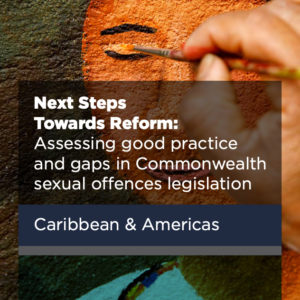In Canada, the criminal law is a federal responsibility and sexual offences are found in the federal Criminal Code of Canada (CC), which applies uniformly across the country.
Sexual assault is included in the Offences against the Person part of the Code (Part VIII), along with the assault offences, which define assault, including for the purposes of the sexual assault provisions. Penalties for sexual assault are higher than penalties for assault. Further, the legislation does not distinguish between penetrative and non-penetrative offences unlike most other Commonwealth jurisdictions. Instead, there are three levels of sexual assault with penalties based on the degree of harm to the complainant rather than on the type of non-consensual sexual act at issue. This approach also requires that consent be expressed affirmatively through words or conduct, passivity or submission is not sufficient and proof of violence or resistance is not required to prove sexual assault. It is sometimes referred to as an ‘affirmative consent’ approach. If all the good practice elements are present, this type of approach can meet good practice standards for human rights compliant sexual offences legislation.
Sexual assault reform has been an ongoing process in Canada. Sexual offences were overhauled in 1983 when antiquated sexual offences were repealed and replaced by the sexual offences noted above and other provisions, including rules governing the admissibility of the evidence of the complainant’s prior sexual history. In 1992 the prior sexual history evidentiary rules were amended in response to a Supreme Court of Canada decision (Seaboyer, 1991) that struck the 1983 provisions down and the consent provisions (definition and list of circumstances in which consent is not obtained in law) as well as a limitation on the accused’s ability to advance the defence of mistaken belief in consent, were added. Further positive reforms were made in 1997 and 2018 but these are not assessed here.
Many of the provisions of the CC meet good practice. All sexual assaults are criminalised. Corroboration is explicitly not required, no moralistic terms are used, there are no offences for consensual sexual activity with persons with disability. There are some close-in-age exceptions which apply to sexual activity where one or both people are under 16 if the sexual activity is consensual and there is no relationship of trust, dependency or authority and the relationship is not otherwise exploitative of the younger person.
In June 2019, Canada completed the process, begun in 1969, of fully decriminalising consensual same-sex sexual activity by repealing the discriminatory age of consent law it had maintained (s 159 CC). It had specified different ages of consent for sexual activity (16 years) and anal intercourse between unmarried people (18). This disproportionately affected people who engage in same-sex anal intercourse. Successive decisions by appellate courts had found this to violate the Canadian Charter of Rights and Freedoms.
Canada is a state party to relevant international and regional human rights treaties, including the Convention on the Elimination of All Forms of Discrimination against Women, the Convention on the Rights of the Child, the Convention on the Rights of Persons with Disabilities, the Convention against Torture and Other Cruel, Inhuman or Degrading Treatment or Punishment and the International Covenant on Civil and Political Rights. It has not joined the Inter-American Convention on the Prevention, Punishment, and Eradication of Violence against Women (Convention of Belém do Pará).
The full assessment of Canada is available here.



